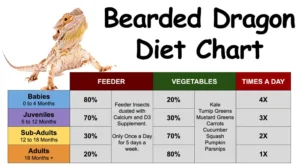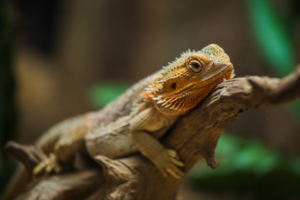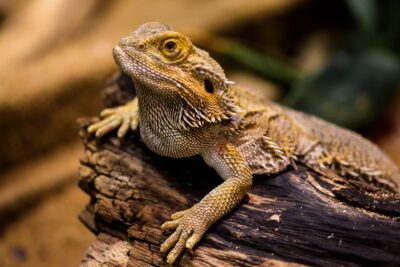Curious about what to feed your bearded dragon? Look no further than the comprehensive guide provided by the bearded dragon food chart. This invaluable resource offers a detailed breakdown of suitable foods for your scaly companion, ensuring they receive the proper nutrition at every meal.
The “bearded dragon food chart” serves as a helpful tool for bearded dragon owners, offering a visual reference or list of recommended foods that are suitable for their pets’ diet. This chart typically categorizes foods into different groups, such as live insects, vegetables, fruits, and occasional treats, along with portion sizes and feeding frequencies.
By consulting the food chart, owners can ensure they provide a varied and balanced diet that meets their bearded dragon’s nutritional requirements. Additionally, the chart may include information on foods to avoid or limit, helping to prevent potential health issues.
Types of Food for bearded dragon

When it comes to feeding a bearded dragon, offering a diverse range of foods is essential to ensure they receive a balanced diet. Here are the main types of food you can provide:
- Live Insects: Bearded dragons are carnivorous reptiles that thrive on live insects. Offer a variety of insects such as crickets, dubia roaches, mealworms, superworms, hornworms, and silkworms. Gut-loading insects with nutritious foods before feeding them to your dragon enhances their nutritional value.
- Leafy Greens: Leafy greens should make up a significant portion of your bearded dragon’s diet. Offer a variety of greens such as collard greens, mustard greens, dandelion greens, kale, bok choy, and turnip greens. These provide essential vitamins, minerals, and fiber.
- Vegetables: Along with leafy greens, offer a variety of vegetables to provide additional nutrients and variety. Suitable options include squash, bell peppers, carrots, zucchini, sweet potatoes, snap peas, and green beans. Chop or grate vegetables into small pieces for easy consumption.
- Fruits: Fruits can be offered as occasional treats due to their higher sugar content. Choose fruits such as berries, apples, mangoes, papayas, and melons. Remove any seeds or pits before feeding.
- Commercial Diets: Commercially available bearded dragon diets, such as pellets or powders, can be convenient and provide a balanced source of nutrition. Look for high-quality products formulated specifically for bearded dragons.
- Occasional Treats: Offer occasional treats to add variety to your bearded dragon’s diet. These can include cooked eggs (without seasoning), pinky mice (for adult dragons), and commercial treats formulated for reptiles.
- Supplements: Dust live insects with calcium powder before feeding them to your bearded dragon to ensure they receive enough calcium for bone health. Additionally, offer a multivitamin supplement a few times a week to cover any potential nutritional gaps.
By offering a balanced mix of these foods, you can ensure your bearded dragon receives the nutrients they need to thrive. Experiment with different foods and observe their preferences and eating habits to provide a varied and nutritious diet.
Bearded dragon food chart

Creating a bearded dragon food chart tailored to different age groups can help ensure that these reptiles receive appropriate nutrition throughout their development. Here’s a general breakdown by age:
- Juveniles (0-6 months old):
- Offer small, appropriately sized live insects such as crickets, dubia roaches, and small mealworms.
- Provide a variety of finely chopped or grated vegetables and leafy greens daily.
- Offer occasional fruits as treats, ensuring they are cut into small pieces and fed in moderation.
- Supplement with calcium powder dusted on insects at least five times per week and multivitamin supplements 2-3 times per week.
- Subadults (6-12 months old):
- Continue offering a variety of live insects, increasing the size as your bearded dragon grows.
- Offer a mix of finely chopped or grated vegetables and leafy greens daily.
- Continue providing occasional fruits as treats, adjusting the portion size based on the dragon’s size.
- Maintain the same supplementation schedule as for juveniles.
- Adults (12+ months old):
- Feed live insects less frequently, transitioning to every other day or a few times per week.
- Offer a variety of vegetables and leafy greens daily, adjusting the portion size based on the dragon’s size and activity level.
- Continue providing occasional fruits as treats, but limit the quantity due to their higher sugar content.
- Reduce supplementation to calcium powder 2-3 times per week and multivitamin supplements once a week.
It’s important to monitor your bearded dragon’s growth, weight, and overall health to adjust their diet accordingly. Consulting with a reptile veterinarian can provide guidance on specific dietary requirements based on your pet’s age, size, and individual needs. Additionally, observing their eating habits and preferences can help fine-tune their diet to ensure optimal nutrition at every stage of life.
Nutritional Supplements
Nutritional supplements play a crucial role in ensuring that your bearded dragon receives all the essential vitamins and minerals they need to thrive. Here are the main types of nutritional supplements commonly used for bearded dragons:
- Calcium: Calcium is essential for bone health and muscle function in bearded dragons. A calcium supplement should be provided by dusting live insects with calcium powder before feeding them to your dragon. Calcium supplementation helps prevent metabolic bone disease (MBD), a common health issue in reptiles.
- Calcium with Vitamin D3: Vitamin D3 is necessary for calcium absorption and utilization. Calcium supplements with added vitamin D3 are beneficial for bearded dragons, especially those housed indoors or with limited access to natural sunlight. Vitamin D3 aids in the absorption of calcium and helps prevent deficiencies.
- Multivitamin Supplements: Multivitamin supplements provide a broad range of essential vitamins and minerals that may be lacking in your bearded dragon’s diet. These supplements typically contain vitamins A, B, C, D, and E, as well as minerals like zinc and selenium. Offer multivitamin supplements a few times a week to ensure your dragon receives all necessary nutrients.
- Probiotics: Probiotics promote a healthy digestive system by supporting beneficial gut bacteria. Adding probiotics to your bearded dragon’s diet can help maintain gut health, aid digestion, and prevent gastrointestinal issues. Probiotics are especially beneficial after a course of antibiotics or during periods of stress.
- Electrolyte Supplements: Electrolyte supplements help replenish essential minerals and electrolytes lost during dehydration or illness. These supplements can be beneficial for rehydrating bearded dragons after illness, stress, or prolonged periods of diarrhea.
When selecting nutritional supplements for your bearded dragon, choose high-quality products specifically formulated for reptiles. Follow the manufacturer’s instructions for dosage and frequency of supplementation, and consult with a reptile veterinarian for personalized advice on meeting your dragon’s nutritional needs.
Additionally, ensure that supplements are properly stored to maintain their efficacy and potency. With proper supplementation, you can help support your bearded dragon’s overall health and well-being.
Water Requirements
Water is essential for the health and well-being of bearded dragons, but their hydration needs can vary based on factors such as age, diet, environment, and activity level.
Here are some general guidelines regarding water requirements for bearded dragons:
- Water Consumption: Bearded dragons obtain most of their hydration from the foods they eat, particularly fresh vegetables and fruits that have a high water content. However, they still require access to a freshwater source to drink.
- Water Dish: Provide a shallow dish of fresh, clean water in your bearded dragon’s enclosure at all times. The dish should be large enough for your dragon to comfortably drink from and shallow enough to prevent drowning.
- Misting: Some bearded dragons may prefer to drink water droplets from misting or spraying. Misting the enclosure with water can also help increase humidity levels, which is beneficial for hydration and shedding.
- Bathing: Offer your bearded dragon occasional baths in lukewarm water, which can help encourage hydration and promote regular bowel movements. Some dragons may drink water while soaking.
- Monitoring Hydration: Monitor your bearded dragon’s hydration levels by observing their behavior and appearance. Signs of dehydration may include sunken eyes, lethargy, wrinkled skin, and reduced appetite.
- Environmental Factors: Environmental conditions, such as temperature and humidity, can affect your bearded dragon’s hydration needs. Ensure that their enclosure provides a suitable temperature gradient and humidity level to support hydration and overall health.
- Dietary Considerations: Certain foods, such as insects and fruits with high water content, can contribute to your bearded dragon’s hydration. Offering a varied diet that includes fresh vegetables and fruits can help ensure they receive adequate moisture from their food.
- Health Issues: Certain health conditions, such as kidney disease or dehydration due to illness, can affect your bearded dragon’s hydration needs. Monitor for signs of illness and consult with a reptile veterinarian if you have concerns about your dragon’s hydration status.
By providing access to fresh water, offering regular baths, monitoring hydration levels, and ensuring a suitable environment and diet, you can help keep your bearded dragon properly hydrated and healthy.
Avoiding toxic foods and plants

Avoiding toxic foods and plants is essential for maintaining the health and safety of your bearded dragon. Here are some common foods and plants that are toxic to bearded dragons and should be avoided:
- Toxic Foods:
- Avocado: Avocado contains a substance called persin, which is toxic to many animals, including bearded dragons. Avoid feeding avocado or any foods containing avocado to your dragon.
- Rhubarb: Rhubarb leaves contain oxalic acid, which can be harmful if ingested in large quantities. Avoid feeding rhubarb or any parts of the rhubarb plant to your dragon.
- Onions and Garlic: Onions and garlic contain compounds that can cause gastrointestinal irritation and red blood cell damage in reptiles. Avoid feeding these foods to your dragon.
- Caffeine and Alcohol: Caffeine and alcohol are toxic to bearded dragons and can cause serious health issues if ingested. Keep these substances away from your dragon at all times.
- Toxic Plants:
- Pothos: Pothos, also known as devil’s ivy, is a common houseplant that is toxic to bearded dragons if ingested. Keep pothos plants out of reach of your dragon or remove them from their enclosure.
- Dieffenbachia: Dieffenbachia, also known as dumb cane, contains calcium oxalate crystals that can cause irritation and swelling if ingested. Keep dieffenbachia plants away from your dragon.
- Philodendron: Philodendron plants contain calcium oxalate crystals similar to dieffenbachia and can cause similar symptoms if ingested. Avoid placing philodendron plants in your dragon’s enclosure.
- Ivy: Ivy plants, including English ivy and other varieties, can be toxic to bearded dragons if ingested. Keep ivy plants out of reach of your dragon.
It’s essential to research any foods or plants before offering them to your bearded dragon to ensure they are safe and non-toxic. If you suspect that your dragon has ingested a toxic substance or plant, contact a veterinarian immediately for guidance and treatment.
Prevention is key to keeping your bearded dragon safe from toxic foods and plants, so always be cautious and vigilant when selecting items for their environment and diet.
Monitoring food intake and weight for health maintenance
Monitoring your bearded dragon’s food intake and weight is crucial for maintaining their health and well-being. Here are some tips for effectively monitoring these aspects:
- Food Intake:
- Keep track of the types and amounts of food your bearded dragon consumes each day. This includes live insects, vegetables, fruits, and any treats.
- Observe your dragon’s eating habits and appetite. Changes in appetite, such as reduced or increased eating, can indicate potential health issues.
- Offer a variety of foods to ensure a balanced diet. Monitor which foods are preferred and adjust the diet as needed to provide proper nutrition.
- Weight Monitoring:
- Regularly weigh your bearded dragon using a digital scale. Record their weight on a consistent schedule, such as once a week or once a month.
- Keep track of weight trends over time. Healthy bearded dragons should exhibit gradual weight gain during growth and maintain a stable weight in adulthood.
- Be aware of signs of weight loss or gain that may indicate underlying health issues. Significant changes in weight should prompt a veterinary evaluation.
- Health Maintenance:
- Use food intake and weight data as part of overall health monitoring. Changes in appetite or weight loss/gain can be early indicators of health problems.
- Ensure that your bearded dragon’s diet is balanced and meets their nutritional needs. Consult with a reptile veterinarian or nutritionist if you have questions or concerns about their diet.
- Provide proper husbandry, including appropriate temperatures, humidity levels, and habitat setup, to support overall health and well-being.
- Schedule regular check-ups with a reptile veterinarian for routine health assessments and preventive care.
By diligently monitoring your bearded dragon’s food intake and weight and promptly addressing any changes or concerns, you can help ensure they maintain optimal health and longevity. Regular observation and proactive care are essential for keeping your dragon healthy and thriving.
Conclusion
The bearded dragon food chart serves as a valuable resource for ensuring your pet receives a balanced and nutritious diet. By providing guidance on suitable foods, portion sizes, and feeding frequencies, this chart helps promote the health and well-being of bearded dragons at every stage of life.
Utilizing the information provided in the chart allows for effective meal planning and ensures that your dragon’s dietary needs are met. Whether you’re a new or experienced owner, incorporating the recommendations from the bearded dragon food chart can contribute to the overall health and happiness of your scaly companion.

